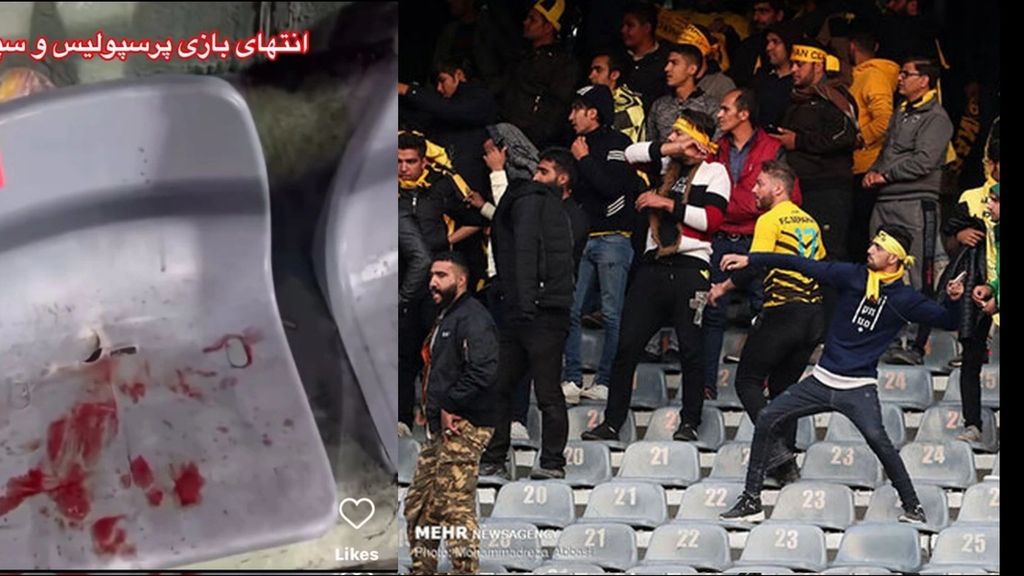Suspicions grew after a recent incident at Tehran’s Azadi Stadium on Wednesday, May 1, during a Champions League match between Sepahan FC and Persepolis FC. During the match male fans of Sepahan hurled sexually charged abuses against female fans of Persepolis and threw stones at them injuring at least one woman.
The incident has provided further ammunition for those opposed to women’s presence at men’s soccer matches who always argue that male football fans swear profanities, so the atmosphere of stadiums is not suitable for women even if they are seated in a separate section.
Sepahan FC-Persepolis FC match at Tehran’s Azadi Stadium Wednesday
“To say that it looks like a scheme to close stadiums to women one by one is underway is neither illusion nor pessimism,” an editorial entitled “Hardliners’ New Scheme To Ban Women’s Entry to Stadiums,Trench by Trench and Stadium by Stadium” in the reformist Etemad newspaper Sunday said.
The article called the alleged scheme a “clever” move to avoid direct defiance of the world’s soccer authority (FIFA) that insists on allowing unrestricted access to stadiums to women in Iran.
Authorities banned one Sepahan fan from attending all matches for ten years for disrespecting women.
“This time, rather than issuing a universal ban on women’s entry to stadiums, every big and small incident that happens during games is to be used as an excuse to ban women from entering that same stadium. FIFA will probably be told that the entry of women into the stadium is not prohibited but has been stopped in a certain stadium "for the time being" for certain reasons and that entry will be allowed in the near future after creation of infrastructures [to accommodate women],” the article added.
In an article entitled “The Suspicious Wednesday At Azadi [Stadium]” on Sunday, the conservative Farhikhtegan also alleged that “certain groups” were behind the incident to put an end to female fans’ presence at men’s soccer matches. “Some incidents have taken place in various stadiums in the past few weeks that seem strange and perhaps suspicious,” Farhikhtegan wrote.
Hardliners have been heavily campaigning against female fans’ presence in the past few weeks. In a statement on April 18, fundamentalist seminarians of Tabriz protested to the province’s governor for authorizing women’s attendance at a match.
“The Yadgar Imam Stadium turned into a parade ground for some unveiled women who violated [the hijab] norms,” they said in their statement.
A week earlier, a female fan’s hugging of a player had caused uproar from hardliners. Hossein Hosseini, the goalkeeper of Esteghlal FC was suspended for embracing the young girl as any physical contact including an embrace with unrelated females is forbidden by Sharia.
The Islamic Republic banned female spectators from football stadiums for over four decades. FIFA tried to convince the authorities for nearly a decade to lift the unwritten ban and threatened to ban Iran from international competitions if it did not comply.
The matter was finally settled in January by the National Security Council which decided that women could be allowed to attend soccer matches in stadiums.
Prior to that authorities had allowed women on a limited scale to watch some matches at the stadium but a few months after hardliner President Ebrahim Raisi took office, the ban was reimposed despite FIFA’s objections.
In March 2022, hundreds of women who had purchased tickets online to watch the World Cup qualifier between the national team and Lebanon in the religious city of Mashhad were refused entry.
The women were tear-gassed, and pepper sprayed by security forces when they insisted that they had the right to watch the game and protested. Several women were reportedly injured in the incident.
Without apologizing for the violence against women, Iran's football federation blamed “ticket forgers” and women who it accused of lying about their gender at the time of the purchase of online tickets.









